E-Mobility 4 Impact
Pilotprojekt für nachhaltige Mobilität in Subsahara-Afrika

Unser Programm E-Mobility 4 Impact unterstützt innovative Pilotprojekte im Bereich Elektromobilität, die zu einer nachhaltigen Verkehrswende in Subsahara-Afrika beitragen. Ziel ist es, durch diese Initiativen entscheidende Erkenntnisse und wertvolle Erfahrungen zu gewinnen, die die Weiterentwicklung nachhaltiger Mobilitätslösungen in der Region beschleunigen.
Programm
Forschung & Entwicklung im Bereich Elektromobilität in Ost- und Westafrika
Wir sind davon überzeugt, dass Elektromobilität einen bedeutenden Beitrag zur Erreichung globaler Klimaziele leisten und die soziale sowie wirtschaftliche Entwicklung in Subsahara-Afrika vorantreiben kann. Um eine umweltfreundliche Verkehrswende zu beschleunigen, sind fundierte Erkenntnisse über erfolgreiche Innovationen, Geschäftsmodelle und die Akzeptanz von Nutzer*innen im E-Mobilitätssektor von entscheidender Bedeutung.
Unser E-Mobility 4 Impact Programm konzentriert sich darauf, das lokale Wissen und Kompetenzen im Elektromobilitätssektor in Ost- und Westafrika zu stärken. In enger Zusammenarbeit mit Sozialunternehmen in Ghana, Nigeria, Uganda und Tansania testen wir Lösungen, um mehr soziale und ökologische Wirkung im Bereich Elektromobilität zu erzielen.
Akzeptanz, Zugänglichkeit und Finanzierbarkeit verbessern
Die Pilotprojekte arbeiten an Herausforderungen rund um Akzeptanz, Zugänglichkeit und Finanzierbarkeit. Die Lösungen stammen dabei aus dem Elektrofahrzeugbereich, dem Bereich der Batterietechnologie sowie Lade- und Batteriewechselinfrastruktur. Dabei arbeiten wir mit Akteur*innen aus den Bereichen Energie, Elektroschrott und Recycling, sowie Technologie zusammen.
Sozialunternehmerische Kompetenzen ausbauen
Die Entwicklung erfolgreicher lokaler Lösungen erfordert Kompetenzen, den Bedürfnissen der Kund*innen entsprechend lokale Lösungen zu entwickeln oder an diese anzupassen. Unser Programm bietet Weiterbildungen zu Human-Centered Design und Social Entrepreneurship für lokale Expert*innen und Unternehmer*innen an, damit diese ihre berufliche Karriere oder ihr Unternehmen nachhaltig gestalten.
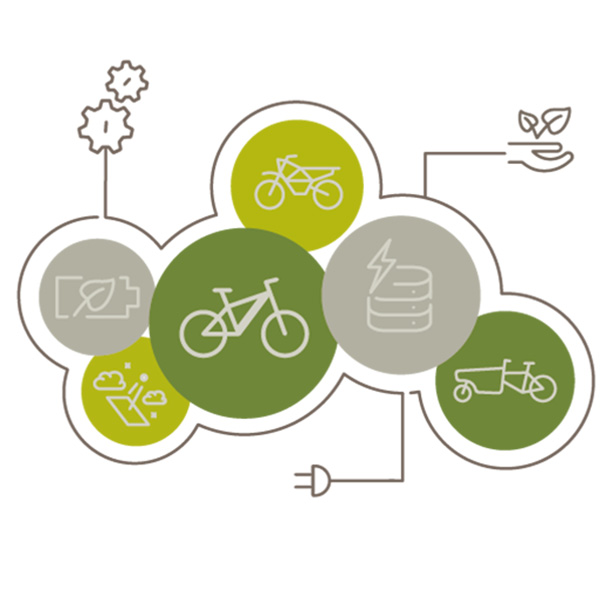
Projekte
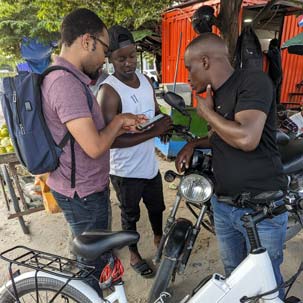
Förderung von Elektromobilität in Tansania: Ride-Sharing von Elektrofahrrädern für Lieferdienste
Laufzeit: 1.10.2024 – 31.12.2025
In Tansania gibt es schätzungsweise bis zu 1 Million Zwei-/Motorräder auf den Straßen (AfEMA Country Report Tanzania 2023), die hauptsächlich von Bodaboda–Fahrer*innen für Lieferdienste genutzt werden. Ersetzt man die Motorräder mit Verbrennungsmotor nur in Daressalaam durch Elektrofahrräder, könnte der CO2-Ausstoß der Zweiräder in Tansania erheblich verringert werden. Für die Bodaboda–Fahrer*innen bietet sich zudem die Chance auf ein höheres Einkommen, da die Betriebskosten von Elektrofahrrädern aufgrund von Einsparungen bei Kraftstoff und Wartung geringer sind. Die Einführung von Ride-Sharing könnte darüber hinaus die Zahl der Fahrzeuge auf den Straßen weiter deutlich verringern.
Ziel des Projekts ist es, die Akzeptanz von Ride-Sharing von Elektrofahrrädern unter Bodaboda-Fahrer*innen für den Lieferdienst zu untersuchen. Es sollen Schlüsselfaktoren identifiziert werden, die die Entscheidung der Fahrer*innen beeinflussen, auf E-Mobilität umzusteigen, und die finanzielle Machbarkeit sowohl eines Ride-Sharing-Modells als auch von Elektrofahrrädern für den Lieferdienst bewertet werden. FikaChu Company Ltd. führt die Studie im Auftrag der Siemens Stiftung auf ihrer Plattform durch.
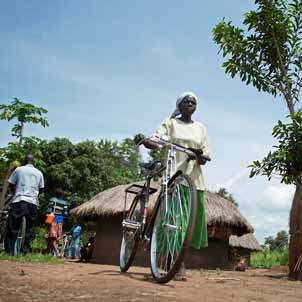
Pilotierung von Elektrofahrrädern bei Kleinbäuer*innen in Norduganda
Laufzeit: 1.10.2024 – 31.12.2025
In peri urbanen und ruralen Gebieten Ugandas ist die Verfügbarkeit von Transportmöglichkeiten begrenzt und oft unzureichend. Viele Menschen gehen deshalb zu Fuß oder nutzen Bodabodas (Motorrad Taxis) mit Verbrennungsmotoren. Das Fehlen von bezahlbaren und zuverlässigen Transportlösungen beeinflusst auch die wirtschaftlichen Aktivitäten und die Lebensqualität insbesondere der abgelegenen Gemeinden wie Kleinbäuer*innen, die ihre Waren zum Markt transportieren müssen.
Im Rahmen der Studie werden 100 Elektrofahrräder an Kleinbäuer*innen in Gulu, Norduganda, über Asset Financing angeboten, um die Nutzbarkeit dieser Fahrzeuge in peri urbanen und ruralen Gebieten zu testen und die Wirkung auf das Leben von Bäuer*innen zu untersuchen. Ziel der Studie ist es, das wirtschaftliche, soziale und ökologische Potenzial der Einführung von Elektrofahrrädern in diesem Kontext zu verstehen. Cycle Connect Ltd. leitet die Studie für die Siemens Stiftung und nimmt Elektrofahrräder der Marke Ebee in Ihr Portfolio auf, um diese mit ihren Kunden zu testen.
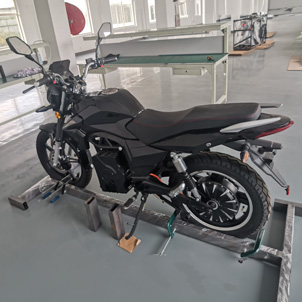
Verbesserung der Akzeptanz von Elektro-motorrädern durch die lokale Produktion von Komponenten für ein Elektromotorrad
Laufzeit: 1.10.2024 – 31.12.2025
Wenn der Verkehrswandel zu einem kohlenstoffarmen Sektor mit neuen wirtschaftlichen Möglichkeiten für Nigeria gelingen soll, ist die lokale Produktion oder Montage von Produkten ein wichtiger Bestandteil. Dies bietet die Chance auf neue Arbeitsplätze und lokale oder regionale Lieferketten. Die lokale Fertigung für den Elektromobilitäts-Sektor ist jedoch mit einigen Herausforderungen verbunden (z.B. Kosten, Qualität, Fähigkeiten).
In diesem Projekt wird die Machbarkeit der lokalen Montage von Elektromotorrädern und der lokalen Produktion einiger Komponenten untersucht. Das Ziel der Studie ist es, die Qualität und Haltbarkeit der lokal produzierten Komponenten für Elektromotorräder zu analysieren, um importierte Komponenten durch diese zu ersetzen. Orbit Electric Automobile Ltd. führt die Studie für die Siemens Stiftung in seiner Lieferkette in Lagos, Nigeria, durch.
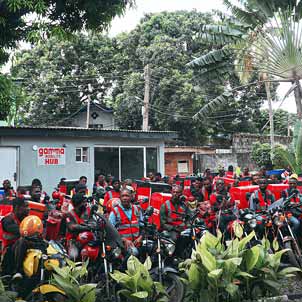
Förderung von Elektromobilität für Lieferdienste in Ghana und Nigeria
Laufzeit: 1.10.2024 – 31.12.2025
Die Nutzung von Motorrädern ist in Ghana und Nigeria für Lieferdienste unverzichtbar, tragen aber erheblich zur Umweltverschmutzung in den Städten bei. Der Übergang zu Elektromotorrädern könnte die CO2-Emissionen bei Lieferdiensten erheblich reduzieren, wenn sie eine praktikable Alternative zu herkömmlichen Motorrädern mit Verbrennungsmotor darstellen.
Die Studie vergleicht die Auswirkungen der Förderung von Elektromotorrädern bei Lieferdiensten in Ghana und Nigeria. Sie bewertet die Vorteile von Elektromotorrädern und vergleicht dafür verschiedener Betriebsmodelle von Lieferplattformen, Elektromotorrädern gegenüber Motorrädern mit Verbrennungsmotor, das Aufladen von Motorrädern zu Hause gegenüber einem Batterietausch-System, und analysiert darüber hinaus die Wirkung auf den Lebensunterhalt von Gig-Arbeitern*innen (z. B. beim Einkommen). Das Projekt wird von Gigmile Technologies Ltd. im Auftrag der Siemens Stiftung durchgeführt, indem Sie elektrische Motorräder auf ihrer Plattform in Lagos, Nigeria, und Accra, Ghana, einführen und testen.
Kontakt
Möchten Sie mehr erfahren oder haben Fragen zur aktuellen Ausschreibung?
Projektmanager E-Mobilität
Sebastian Gruss
sebastian.gruss@siemens-stiftung.org
Unser Schwerpunkt E-Mobilität

E-Mobilität „Made in Africa for Africa“
In Partnerschaften mit Sozialunternehmen, lokalen Behörden und internationalen Organisationen fördern wir in Subsahara-Afrika die Entwicklung nachhaltiger Lösungen und Geschäftsmodelle im Bereich E-Mobilität. Erfahren Sie mehr über unseren Ansatz sowie weitere Projekte im Bereich E-Mobilität.
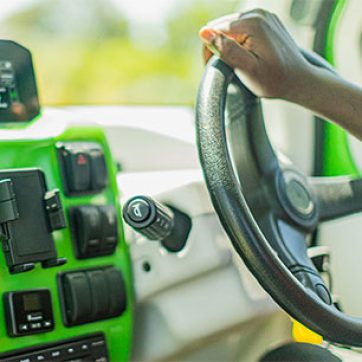
Piloting and Prepare to Scale E-Mobility in Kenya
Als Teil der Deutschen Klimatechnologieinitiative (DKTI) unterstützen wir im Rahmen unseres Projekts „Piloting and Prepare to Scale E-Mobility in Kenya“ gemeinsam mit der GIZ die Entwicklung lokaler E-Mobilitätslösungen in Kenia.


